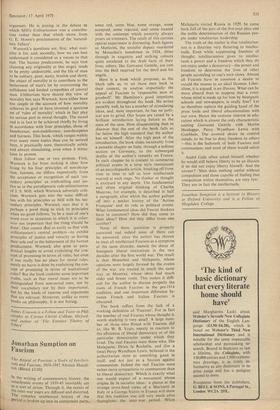Jonathan Sumption on Fascism
The Appeal of Fascism: a Study of Intollect- uals and Fascism, 19194945 Alastair Hamil- ton (Blond £3.00) In the writing of contemporary history, the cataclysmic events of 1939-45 inevitably act as a sort of prism. Through it. the events of the inter-war years are diffused and distorted. The complex intellectual history of the period is broken up into its component parts, some red, some blue, some orange, some accepted, some rejected, and some treated with the contempt which posterity always pours on trimmers. The result of this curious optical experiment is distressing. Such figures as Matteotti, the socialist deputy murdered by Mussolini's henchmen in 1924, shine through in exquisite and striking colours quite unrelated to the drab facts of their lives; others, like Giovanni Gentile, are cast into the Hell reserved for the devil and his angels.
Here is a book which proposes, as the blurb tells us, to set these men back in their context, to analyse impartially the appeal of Fascism to 'responsible men of goodwill'. Mr Hamilton's good intentions are evident throughout the book. He writes passably well, he has a number of stimulating ideas, and, most important, he has no polit- ical axe to grind. Our hopes are raised by a brilliant introduction laying before us the state of the case. How disappointing then to discover that the rest of the book falls so far below the high standard that the author has set himself. After the high peak of the introduction, the book slides inexorably from a passable chapter on Italy, through a tedious section on Germany, to the submerged depths of the author's remarks on France. In each chapter he is content to summarise political events in a terse style reminiscent of an encyclopaedia article, breaking off from time to time to tell us how intellectuals reacted at each stage. No thinker or thought is analysed in any depth. The fundamental and often original thinking of Charles Maurras, for example, is described in half a paragraph, after which the author gallops off into a pocket history of the 'Action Francaise' and its role in political events. What fundamental ideas did Fascist thinkers have in common? How did they come to their ideas? How did they differ from one another?
None of these questions is properly answered and indeed none of them can be answered, since the author has chosen to treat all intellectual Fascism as a symptom of the same disorder, namely the decay of bourgeois liberal institutions in the two decades after the first world war. The result is that Mussolini and Malaparte, whose opinions were largely formed by the events of the war, are treated in much the same way as Maurras, whose ideas had much older and firmer roots. This makes it diffi- cult for the author to discuss properly the roots of French Fascism in the pre-1914 tradition, and one important difference be- tween French and Italian Fascism is obscured. The book suffers from the lack of a working definition of 'Fascism'. For in fact the number of real Fascists whose thought is worth studying is very small. A large num- ber of those who flirted with Fascism did so, like W. B. Yeats, merely in reaction to the effeteness of liberal democracy or of the particular democracies under which they lived. The real Fascists were those who, like Malaparte, Drieu la Rochelle, and (for a time) Percy Wyndham Lewis, believed in the authoritarian state as something good in itself, and not just as a bastion against communism. Indeed the real Fascists were rather more sympathetic to communism than to liberal democracy. Which is exactly what one would expect of a movement whose origins lie in socialist ideas: a glance at the strange cross-bred views of a Marinetti in Italy or a George Valois in France will show that this tradition was still very much alive throughout the inter-war period. When Malaparte visited Russia in 1929, he came back full of the joys of the five-year plan and the noble determination of the Russian peo- ple under totalitarian leadership.
The truth of the matter is that totalitarian- ism is a doctrine very flattering to intellec- tuals. Even while suppressing freedom of thought, totalitarianism gives to intellec- tuals a power and a freedom which they do not enjoy under a democracy—the power and freedom to determine the lives of other people according to one's own views. Almost all Fascists have in common a desire to mould the masses to an ideal likeness. Liber- alism, it is argued, is an illusion. What can be more absurd than to suppose that a voter whose mind is made up for him by bourgeois schools and newspapers, is really free? Let us therefore replace the guiding hand Of the press lords and liberal educationalists with our own. Hence the extreme interest in edu- cation which is almost the only characteristic uniting Giovanni Gentile with Martin Heidegger, Percy Wyndham Lewis with Goebbels. The avowed desire to control minds, to be free to deny freedom to others —this is the hallmark of both Fascism and communism, and most of them would admit it.
Andre Gide often asked himself whether he would still believe liberty to be an illusion if he did not enjoy liberty himself. And the answer? 'Man does nothing useful without compulsion and those capable of finding that compulsion within themselves are very few.' They are in fact the intellectuals.
Jonathan Sumption is a lecturer in History at Oxford University and is a Fellow of Magdalen College






































 Previous page
Previous page